A Research Proposal: Measuring Bioethics in Healthcare Management
VerifiedAdded on 2023/06/09
|16
|3610
|214
Report
AI Summary
This research proposal explores the measurement and applicability of bioethical principles in healthcare management practices and decision-making. It reviews existing literature, identifies gaps, and proposes a mixed-methods research design involving quantitative surveys and qualitative focus group discussions with healthcare providers in Australia. The study aims to determine if bioethical principles like justice, beneficence, autonomy, non-maleficence, truthfulness, and confidentiality can be quantitatively or qualitatively measured in terms of their influence on healthcare management decisions, utilizing tools like the Analytical Hierarchy Process and statistical analysis with SPSS. Ethical considerations and potential research limitations are also addressed.
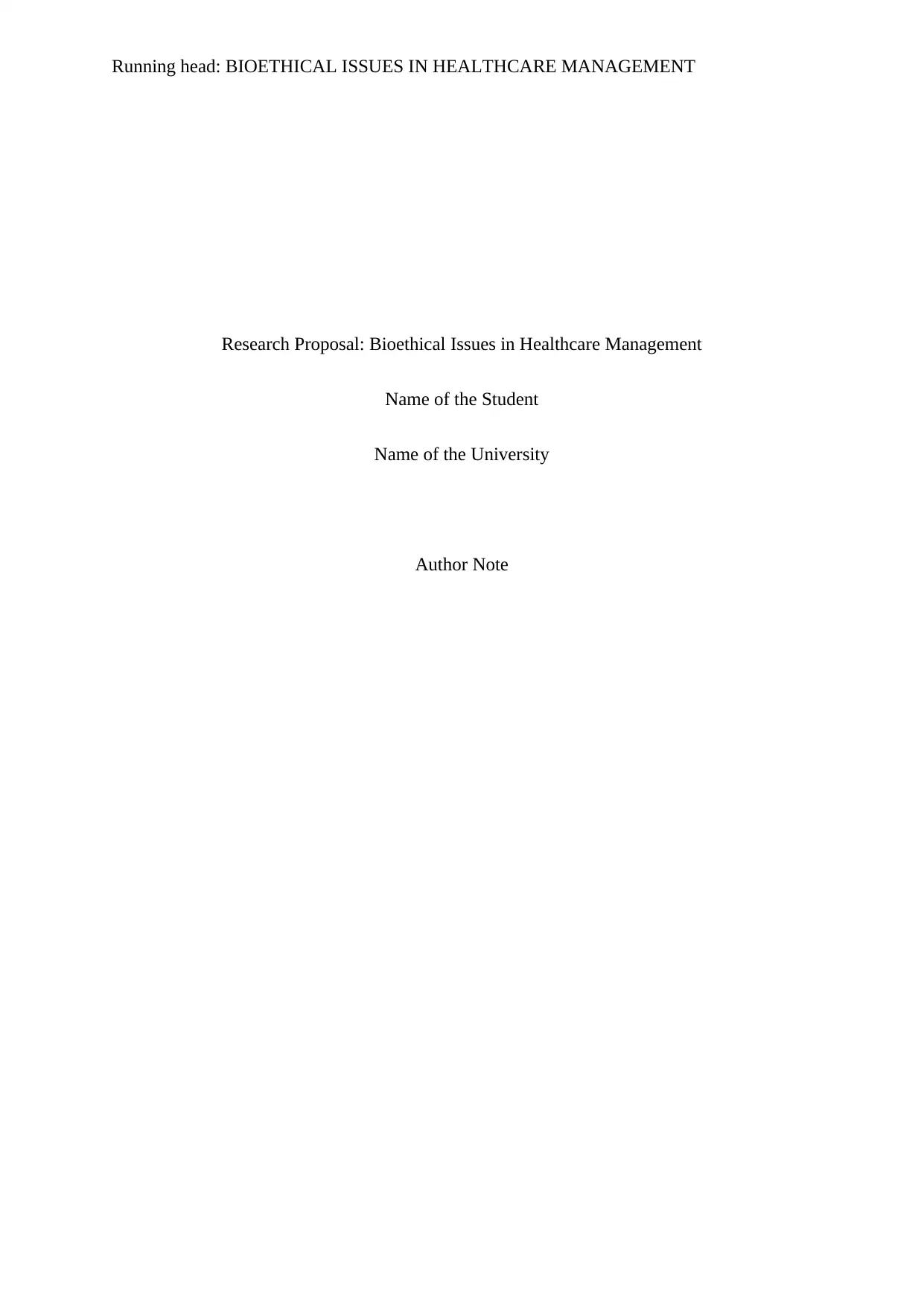
Running head: BIOETHICAL ISSUES IN HEALTHCARE MANAGEMENT
Research Proposal: Bioethical Issues in Healthcare Management
Name of the Student
Name of the University
Author Note
Research Proposal: Bioethical Issues in Healthcare Management
Name of the Student
Name of the University
Author Note
Paraphrase This Document
Need a fresh take? Get an instant paraphrase of this document with our AI Paraphraser
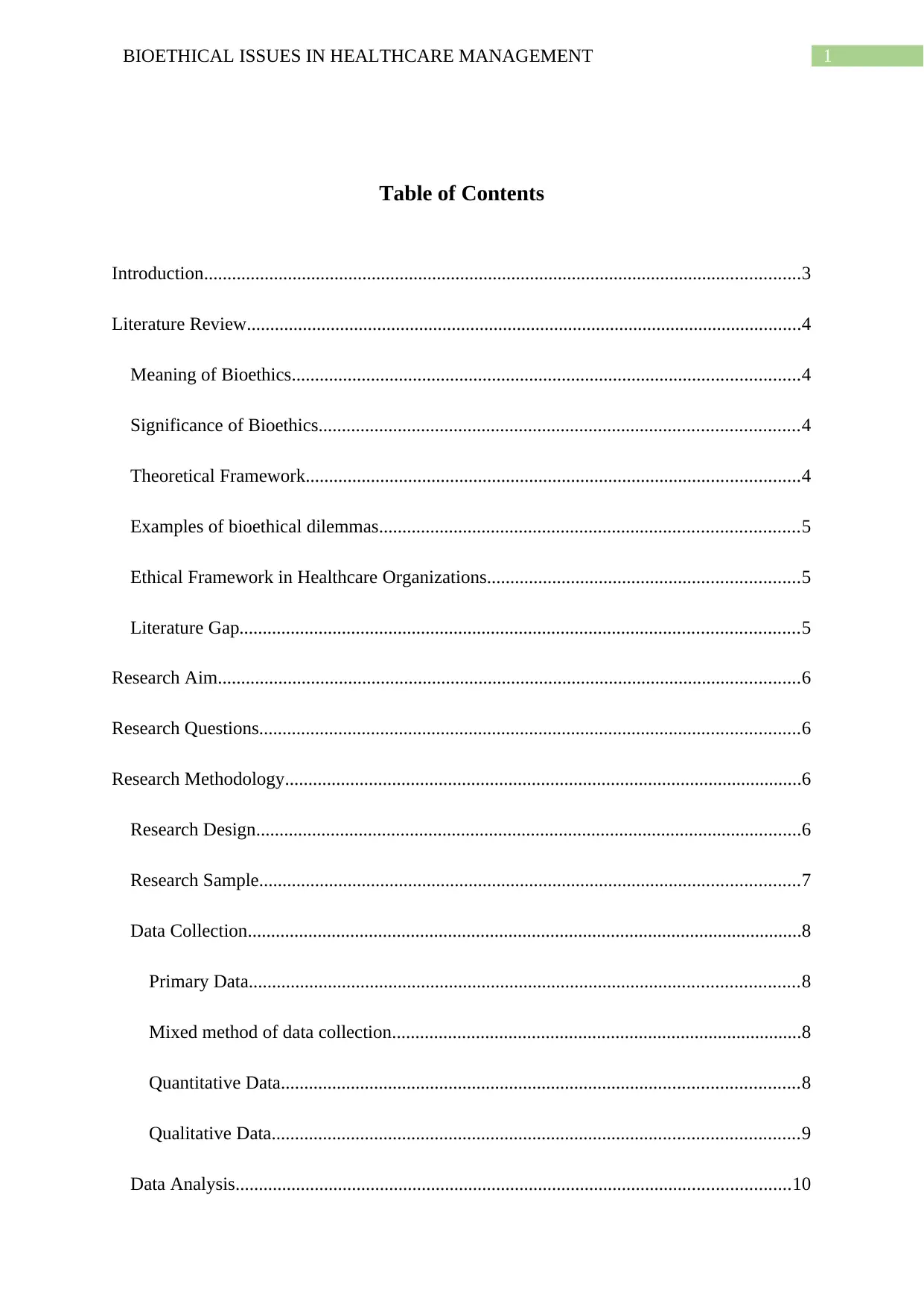
1BIOETHICAL ISSUES IN HEALTHCARE MANAGEMENT
Table of Contents
Introduction................................................................................................................................3
Literature Review.......................................................................................................................4
Meaning of Bioethics.............................................................................................................4
Significance of Bioethics.......................................................................................................4
Theoretical Framework..........................................................................................................4
Examples of bioethical dilemmas..........................................................................................5
Ethical Framework in Healthcare Organizations...................................................................5
Literature Gap........................................................................................................................5
Research Aim.............................................................................................................................6
Research Questions....................................................................................................................6
Research Methodology...............................................................................................................6
Research Design.....................................................................................................................6
Research Sample....................................................................................................................7
Data Collection.......................................................................................................................8
Primary Data......................................................................................................................8
Mixed method of data collection........................................................................................8
Quantitative Data...............................................................................................................8
Qualitative Data.................................................................................................................9
Data Analysis.......................................................................................................................10
Table of Contents
Introduction................................................................................................................................3
Literature Review.......................................................................................................................4
Meaning of Bioethics.............................................................................................................4
Significance of Bioethics.......................................................................................................4
Theoretical Framework..........................................................................................................4
Examples of bioethical dilemmas..........................................................................................5
Ethical Framework in Healthcare Organizations...................................................................5
Literature Gap........................................................................................................................5
Research Aim.............................................................................................................................6
Research Questions....................................................................................................................6
Research Methodology...............................................................................................................6
Research Design.....................................................................................................................6
Research Sample....................................................................................................................7
Data Collection.......................................................................................................................8
Primary Data......................................................................................................................8
Mixed method of data collection........................................................................................8
Quantitative Data...............................................................................................................8
Qualitative Data.................................................................................................................9
Data Analysis.......................................................................................................................10
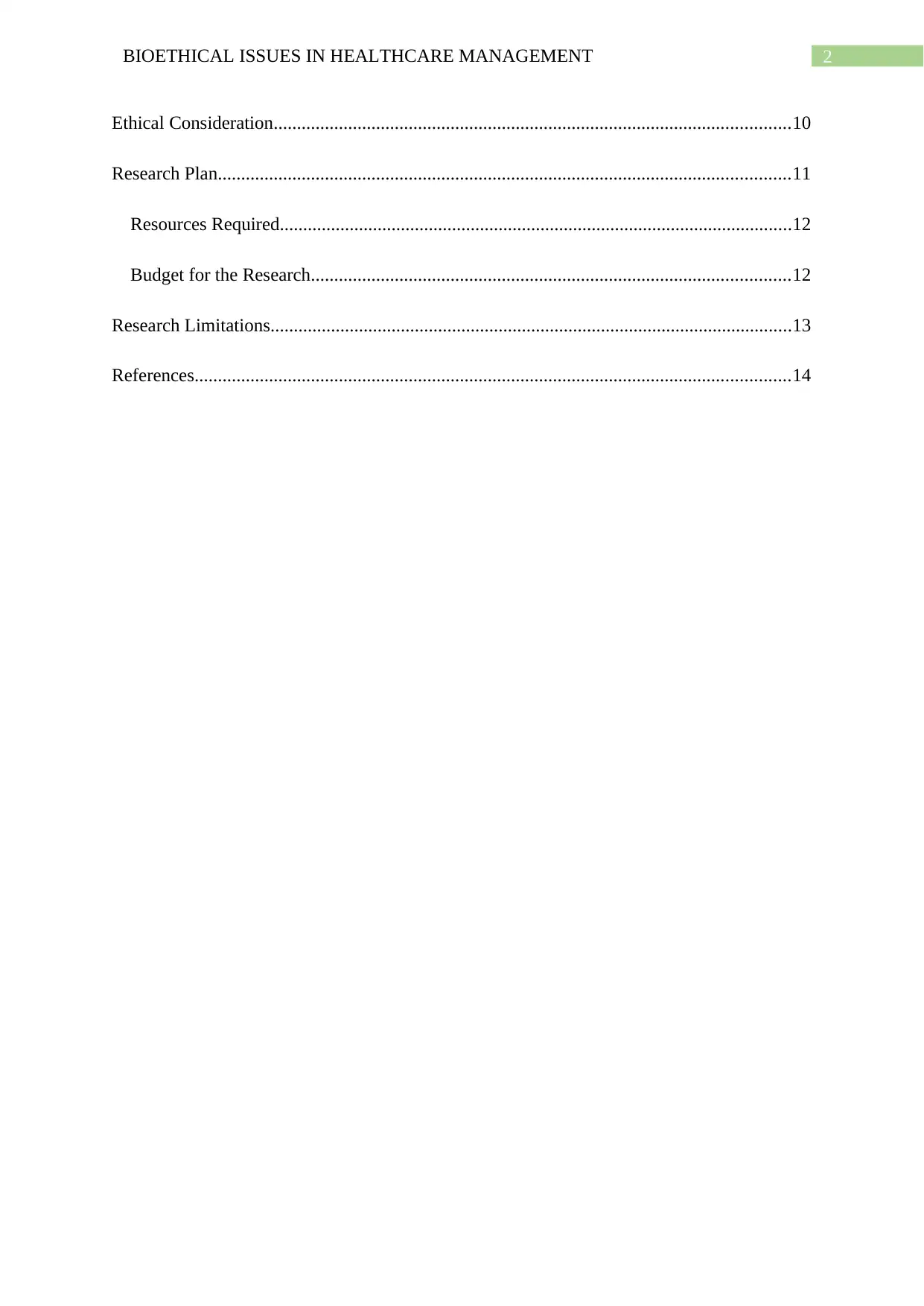
2BIOETHICAL ISSUES IN HEALTHCARE MANAGEMENT
Ethical Consideration...............................................................................................................10
Research Plan...........................................................................................................................11
Resources Required..............................................................................................................12
Budget for the Research.......................................................................................................12
Research Limitations................................................................................................................13
References................................................................................................................................14
Ethical Consideration...............................................................................................................10
Research Plan...........................................................................................................................11
Resources Required..............................................................................................................12
Budget for the Research.......................................................................................................12
Research Limitations................................................................................................................13
References................................................................................................................................14
⊘ This is a preview!⊘
Do you want full access?
Subscribe today to unlock all pages.

Trusted by 1+ million students worldwide
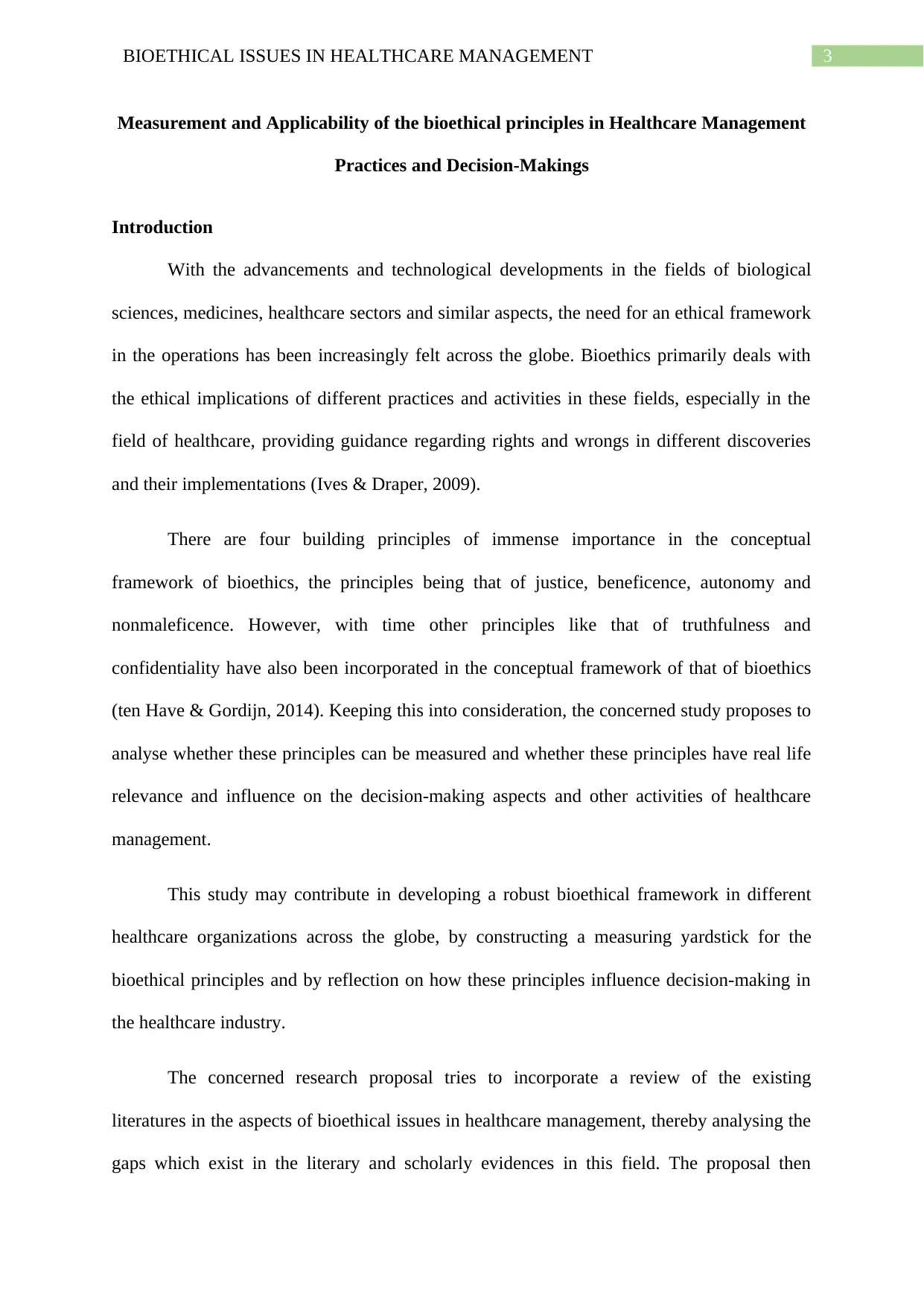
3BIOETHICAL ISSUES IN HEALTHCARE MANAGEMENT
Measurement and Applicability of the bioethical principles in Healthcare Management
Practices and Decision-Makings
Introduction
With the advancements and technological developments in the fields of biological
sciences, medicines, healthcare sectors and similar aspects, the need for an ethical framework
in the operations has been increasingly felt across the globe. Bioethics primarily deals with
the ethical implications of different practices and activities in these fields, especially in the
field of healthcare, providing guidance regarding rights and wrongs in different discoveries
and their implementations (Ives & Draper, 2009).
There are four building principles of immense importance in the conceptual
framework of bioethics, the principles being that of justice, beneficence, autonomy and
nonmaleficence. However, with time other principles like that of truthfulness and
confidentiality have also been incorporated in the conceptual framework of that of bioethics
(ten Have & Gordijn, 2014). Keeping this into consideration, the concerned study proposes to
analyse whether these principles can be measured and whether these principles have real life
relevance and influence on the decision-making aspects and other activities of healthcare
management.
This study may contribute in developing a robust bioethical framework in different
healthcare organizations across the globe, by constructing a measuring yardstick for the
bioethical principles and by reflection on how these principles influence decision-making in
the healthcare industry.
The concerned research proposal tries to incorporate a review of the existing
literatures in the aspects of bioethical issues in healthcare management, thereby analysing the
gaps which exist in the literary and scholarly evidences in this field. The proposal then
Measurement and Applicability of the bioethical principles in Healthcare Management
Practices and Decision-Makings
Introduction
With the advancements and technological developments in the fields of biological
sciences, medicines, healthcare sectors and similar aspects, the need for an ethical framework
in the operations has been increasingly felt across the globe. Bioethics primarily deals with
the ethical implications of different practices and activities in these fields, especially in the
field of healthcare, providing guidance regarding rights and wrongs in different discoveries
and their implementations (Ives & Draper, 2009).
There are four building principles of immense importance in the conceptual
framework of bioethics, the principles being that of justice, beneficence, autonomy and
nonmaleficence. However, with time other principles like that of truthfulness and
confidentiality have also been incorporated in the conceptual framework of that of bioethics
(ten Have & Gordijn, 2014). Keeping this into consideration, the concerned study proposes to
analyse whether these principles can be measured and whether these principles have real life
relevance and influence on the decision-making aspects and other activities of healthcare
management.
This study may contribute in developing a robust bioethical framework in different
healthcare organizations across the globe, by constructing a measuring yardstick for the
bioethical principles and by reflection on how these principles influence decision-making in
the healthcare industry.
The concerned research proposal tries to incorporate a review of the existing
literatures in the aspects of bioethical issues in healthcare management, thereby analysing the
gaps which exist in the literary and scholarly evidences in this field. The proposal then
Paraphrase This Document
Need a fresh take? Get an instant paraphrase of this document with our AI Paraphraser
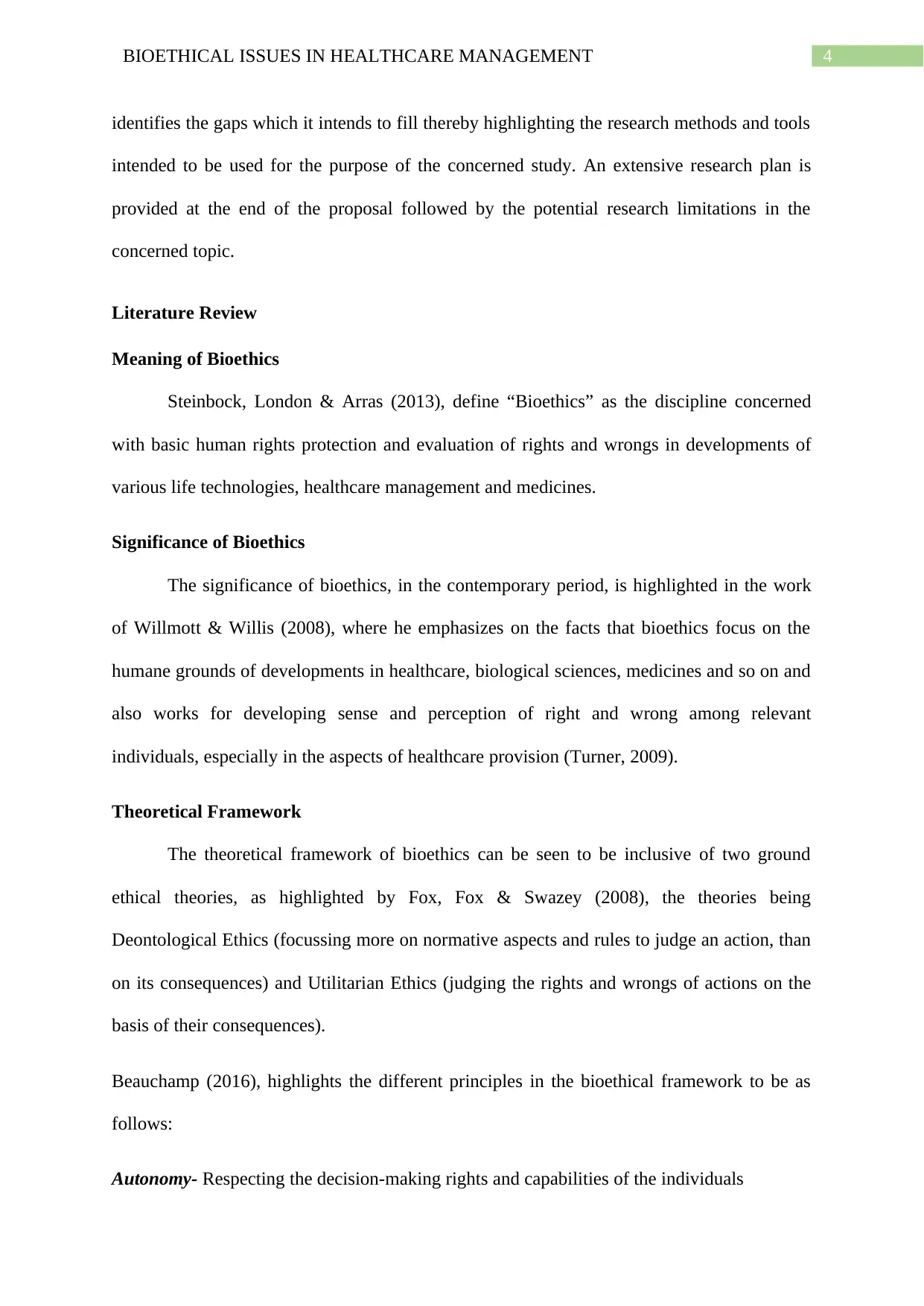
4BIOETHICAL ISSUES IN HEALTHCARE MANAGEMENT
identifies the gaps which it intends to fill thereby highlighting the research methods and tools
intended to be used for the purpose of the concerned study. An extensive research plan is
provided at the end of the proposal followed by the potential research limitations in the
concerned topic.
Literature Review
Meaning of Bioethics
Steinbock, London & Arras (2013), define “Bioethics” as the discipline concerned
with basic human rights protection and evaluation of rights and wrongs in developments of
various life technologies, healthcare management and medicines.
Significance of Bioethics
The significance of bioethics, in the contemporary period, is highlighted in the work
of Willmott & Willis (2008), where he emphasizes on the facts that bioethics focus on the
humane grounds of developments in healthcare, biological sciences, medicines and so on and
also works for developing sense and perception of right and wrong among relevant
individuals, especially in the aspects of healthcare provision (Turner, 2009).
Theoretical Framework
The theoretical framework of bioethics can be seen to be inclusive of two ground
ethical theories, as highlighted by Fox, Fox & Swazey (2008), the theories being
Deontological Ethics (focussing more on normative aspects and rules to judge an action, than
on its consequences) and Utilitarian Ethics (judging the rights and wrongs of actions on the
basis of their consequences).
Beauchamp (2016), highlights the different principles in the bioethical framework to be as
follows:
Autonomy- Respecting the decision-making rights and capabilities of the individuals
identifies the gaps which it intends to fill thereby highlighting the research methods and tools
intended to be used for the purpose of the concerned study. An extensive research plan is
provided at the end of the proposal followed by the potential research limitations in the
concerned topic.
Literature Review
Meaning of Bioethics
Steinbock, London & Arras (2013), define “Bioethics” as the discipline concerned
with basic human rights protection and evaluation of rights and wrongs in developments of
various life technologies, healthcare management and medicines.
Significance of Bioethics
The significance of bioethics, in the contemporary period, is highlighted in the work
of Willmott & Willis (2008), where he emphasizes on the facts that bioethics focus on the
humane grounds of developments in healthcare, biological sciences, medicines and so on and
also works for developing sense and perception of right and wrong among relevant
individuals, especially in the aspects of healthcare provision (Turner, 2009).
Theoretical Framework
The theoretical framework of bioethics can be seen to be inclusive of two ground
ethical theories, as highlighted by Fox, Fox & Swazey (2008), the theories being
Deontological Ethics (focussing more on normative aspects and rules to judge an action, than
on its consequences) and Utilitarian Ethics (judging the rights and wrongs of actions on the
basis of their consequences).
Beauchamp (2016), highlights the different principles in the bioethical framework to be as
follows:
Autonomy- Respecting the decision-making rights and capabilities of the individuals
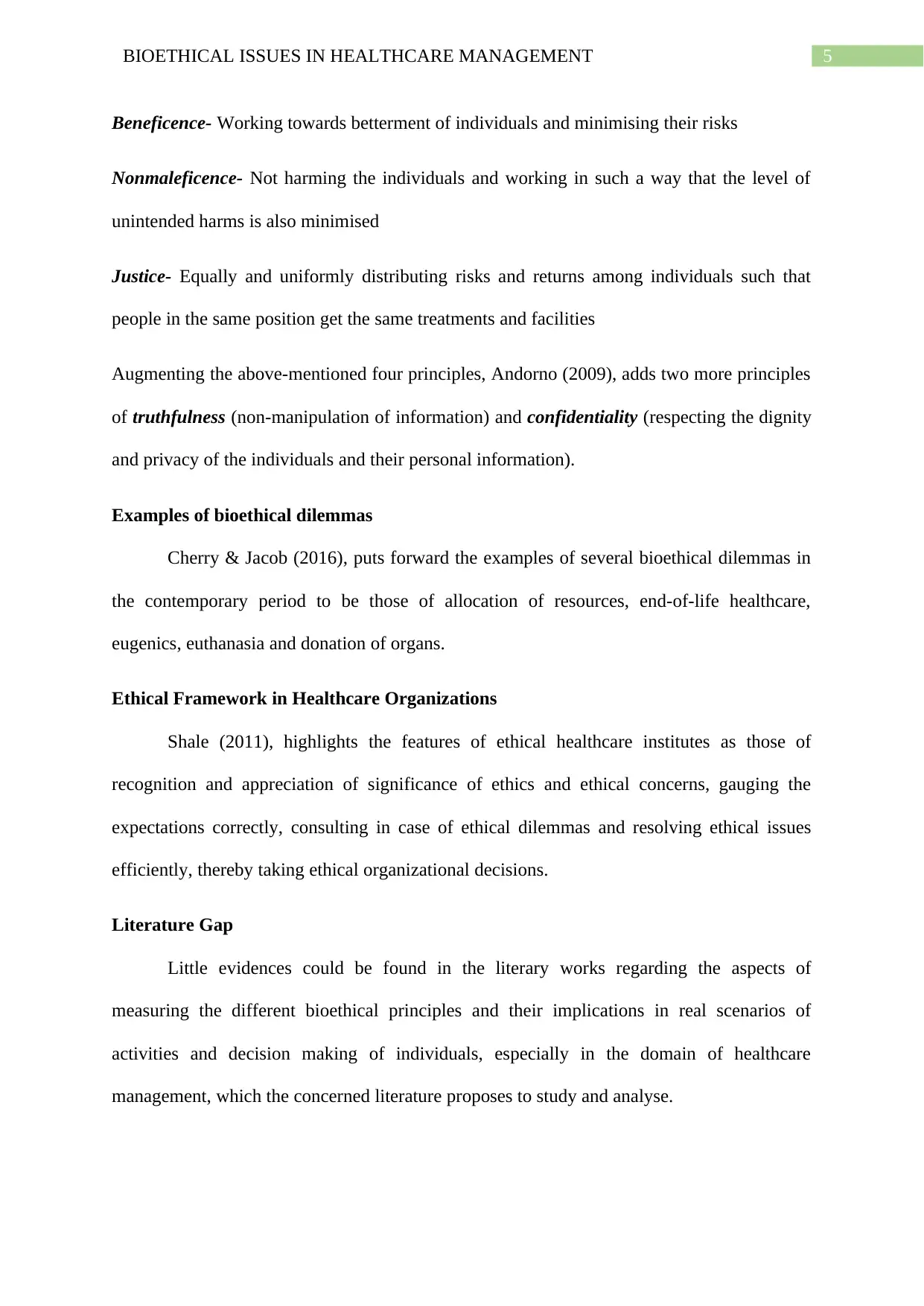
5BIOETHICAL ISSUES IN HEALTHCARE MANAGEMENT
Beneficence- Working towards betterment of individuals and minimising their risks
Nonmaleficence- Not harming the individuals and working in such a way that the level of
unintended harms is also minimised
Justice- Equally and uniformly distributing risks and returns among individuals such that
people in the same position get the same treatments and facilities
Augmenting the above-mentioned four principles, Andorno (2009), adds two more principles
of truthfulness (non-manipulation of information) and confidentiality (respecting the dignity
and privacy of the individuals and their personal information).
Examples of bioethical dilemmas
Cherry & Jacob (2016), puts forward the examples of several bioethical dilemmas in
the contemporary period to be those of allocation of resources, end-of-life healthcare,
eugenics, euthanasia and donation of organs.
Ethical Framework in Healthcare Organizations
Shale (2011), highlights the features of ethical healthcare institutes as those of
recognition and appreciation of significance of ethics and ethical concerns, gauging the
expectations correctly, consulting in case of ethical dilemmas and resolving ethical issues
efficiently, thereby taking ethical organizational decisions.
Literature Gap
Little evidences could be found in the literary works regarding the aspects of
measuring the different bioethical principles and their implications in real scenarios of
activities and decision making of individuals, especially in the domain of healthcare
management, which the concerned literature proposes to study and analyse.
Beneficence- Working towards betterment of individuals and minimising their risks
Nonmaleficence- Not harming the individuals and working in such a way that the level of
unintended harms is also minimised
Justice- Equally and uniformly distributing risks and returns among individuals such that
people in the same position get the same treatments and facilities
Augmenting the above-mentioned four principles, Andorno (2009), adds two more principles
of truthfulness (non-manipulation of information) and confidentiality (respecting the dignity
and privacy of the individuals and their personal information).
Examples of bioethical dilemmas
Cherry & Jacob (2016), puts forward the examples of several bioethical dilemmas in
the contemporary period to be those of allocation of resources, end-of-life healthcare,
eugenics, euthanasia and donation of organs.
Ethical Framework in Healthcare Organizations
Shale (2011), highlights the features of ethical healthcare institutes as those of
recognition and appreciation of significance of ethics and ethical concerns, gauging the
expectations correctly, consulting in case of ethical dilemmas and resolving ethical issues
efficiently, thereby taking ethical organizational decisions.
Literature Gap
Little evidences could be found in the literary works regarding the aspects of
measuring the different bioethical principles and their implications in real scenarios of
activities and decision making of individuals, especially in the domain of healthcare
management, which the concerned literature proposes to study and analyse.
⊘ This is a preview!⊘
Do you want full access?
Subscribe today to unlock all pages.

Trusted by 1+ million students worldwide
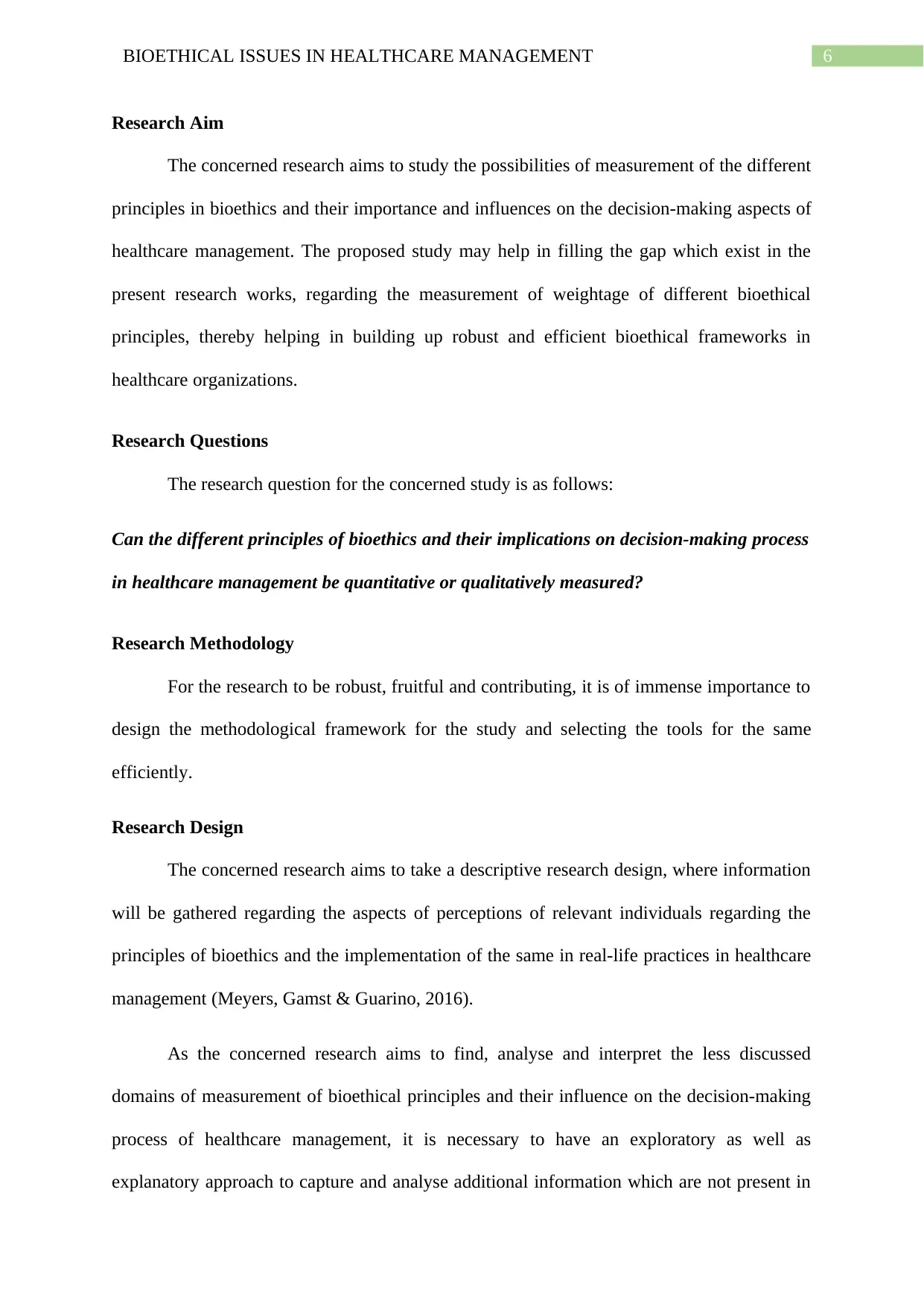
6BIOETHICAL ISSUES IN HEALTHCARE MANAGEMENT
Research Aim
The concerned research aims to study the possibilities of measurement of the different
principles in bioethics and their importance and influences on the decision-making aspects of
healthcare management. The proposed study may help in filling the gap which exist in the
present research works, regarding the measurement of weightage of different bioethical
principles, thereby helping in building up robust and efficient bioethical frameworks in
healthcare organizations.
Research Questions
The research question for the concerned study is as follows:
Can the different principles of bioethics and their implications on decision-making process
in healthcare management be quantitative or qualitatively measured?
Research Methodology
For the research to be robust, fruitful and contributing, it is of immense importance to
design the methodological framework for the study and selecting the tools for the same
efficiently.
Research Design
The concerned research aims to take a descriptive research design, where information
will be gathered regarding the aspects of perceptions of relevant individuals regarding the
principles of bioethics and the implementation of the same in real-life practices in healthcare
management (Meyers, Gamst & Guarino, 2016).
As the concerned research aims to find, analyse and interpret the less discussed
domains of measurement of bioethical principles and their influence on the decision-making
process of healthcare management, it is necessary to have an exploratory as well as
explanatory approach to capture and analyse additional information which are not present in
Research Aim
The concerned research aims to study the possibilities of measurement of the different
principles in bioethics and their importance and influences on the decision-making aspects of
healthcare management. The proposed study may help in filling the gap which exist in the
present research works, regarding the measurement of weightage of different bioethical
principles, thereby helping in building up robust and efficient bioethical frameworks in
healthcare organizations.
Research Questions
The research question for the concerned study is as follows:
Can the different principles of bioethics and their implications on decision-making process
in healthcare management be quantitative or qualitatively measured?
Research Methodology
For the research to be robust, fruitful and contributing, it is of immense importance to
design the methodological framework for the study and selecting the tools for the same
efficiently.
Research Design
The concerned research aims to take a descriptive research design, where information
will be gathered regarding the aspects of perceptions of relevant individuals regarding the
principles of bioethics and the implementation of the same in real-life practices in healthcare
management (Meyers, Gamst & Guarino, 2016).
As the concerned research aims to find, analyse and interpret the less discussed
domains of measurement of bioethical principles and their influence on the decision-making
process of healthcare management, it is necessary to have an exploratory as well as
explanatory approach to capture and analyse additional information which are not present in
Paraphrase This Document
Need a fresh take? Get an instant paraphrase of this document with our AI Paraphraser
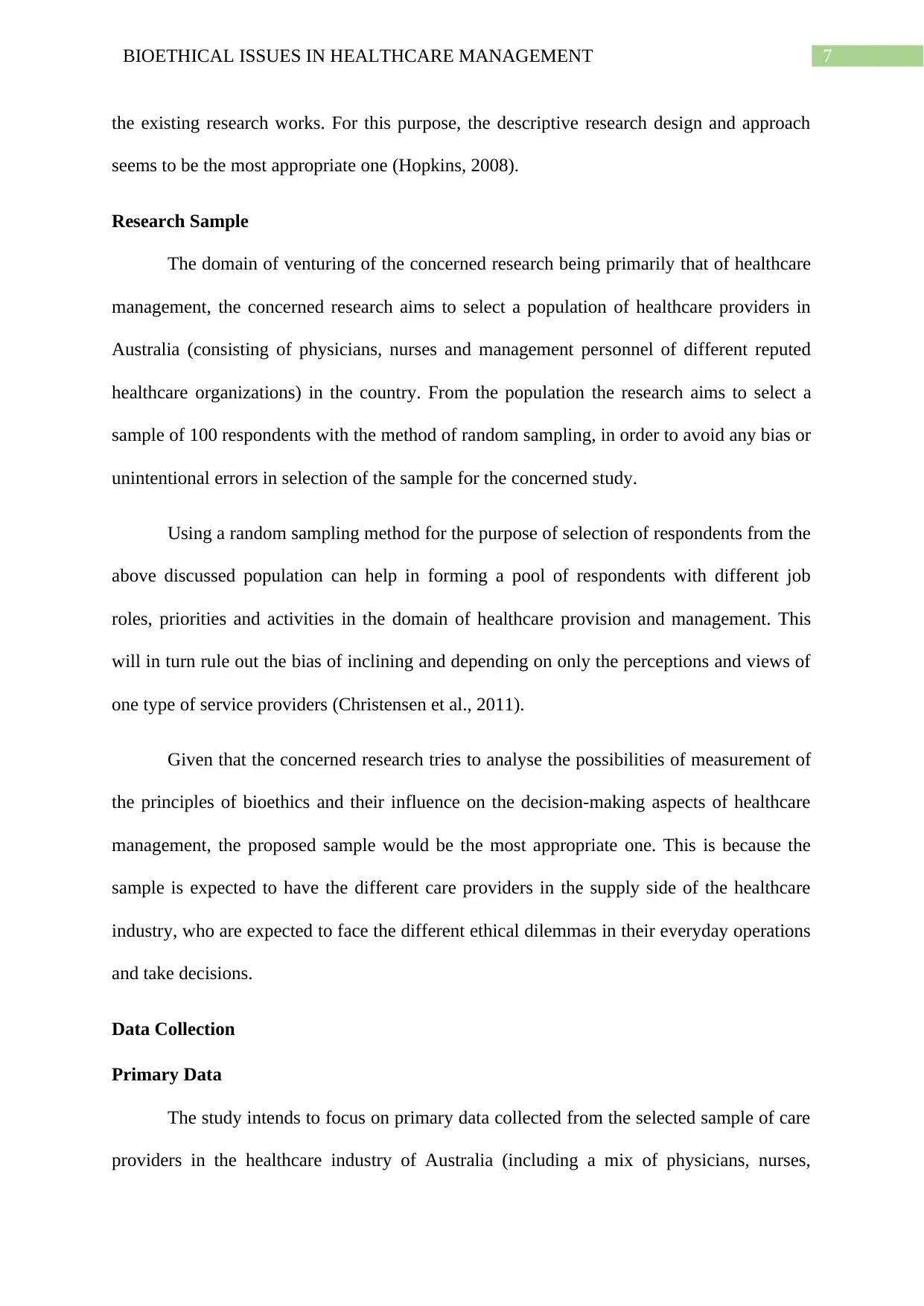
7BIOETHICAL ISSUES IN HEALTHCARE MANAGEMENT
the existing research works. For this purpose, the descriptive research design and approach
seems to be the most appropriate one (Hopkins, 2008).
Research Sample
The domain of venturing of the concerned research being primarily that of healthcare
management, the concerned research aims to select a population of healthcare providers in
Australia (consisting of physicians, nurses and management personnel of different reputed
healthcare organizations) in the country. From the population the research aims to select a
sample of 100 respondents with the method of random sampling, in order to avoid any bias or
unintentional errors in selection of the sample for the concerned study.
Using a random sampling method for the purpose of selection of respondents from the
above discussed population can help in forming a pool of respondents with different job
roles, priorities and activities in the domain of healthcare provision and management. This
will in turn rule out the bias of inclining and depending on only the perceptions and views of
one type of service providers (Christensen et al., 2011).
Given that the concerned research tries to analyse the possibilities of measurement of
the principles of bioethics and their influence on the decision-making aspects of healthcare
management, the proposed sample would be the most appropriate one. This is because the
sample is expected to have the different care providers in the supply side of the healthcare
industry, who are expected to face the different ethical dilemmas in their everyday operations
and take decisions.
Data Collection
Primary Data
The study intends to focus on primary data collected from the selected sample of care
providers in the healthcare industry of Australia (including a mix of physicians, nurses,
the existing research works. For this purpose, the descriptive research design and approach
seems to be the most appropriate one (Hopkins, 2008).
Research Sample
The domain of venturing of the concerned research being primarily that of healthcare
management, the concerned research aims to select a population of healthcare providers in
Australia (consisting of physicians, nurses and management personnel of different reputed
healthcare organizations) in the country. From the population the research aims to select a
sample of 100 respondents with the method of random sampling, in order to avoid any bias or
unintentional errors in selection of the sample for the concerned study.
Using a random sampling method for the purpose of selection of respondents from the
above discussed population can help in forming a pool of respondents with different job
roles, priorities and activities in the domain of healthcare provision and management. This
will in turn rule out the bias of inclining and depending on only the perceptions and views of
one type of service providers (Christensen et al., 2011).
Given that the concerned research tries to analyse the possibilities of measurement of
the principles of bioethics and their influence on the decision-making aspects of healthcare
management, the proposed sample would be the most appropriate one. This is because the
sample is expected to have the different care providers in the supply side of the healthcare
industry, who are expected to face the different ethical dilemmas in their everyday operations
and take decisions.
Data Collection
Primary Data
The study intends to focus on primary data collected from the selected sample of care
providers in the healthcare industry of Australia (including a mix of physicians, nurses,
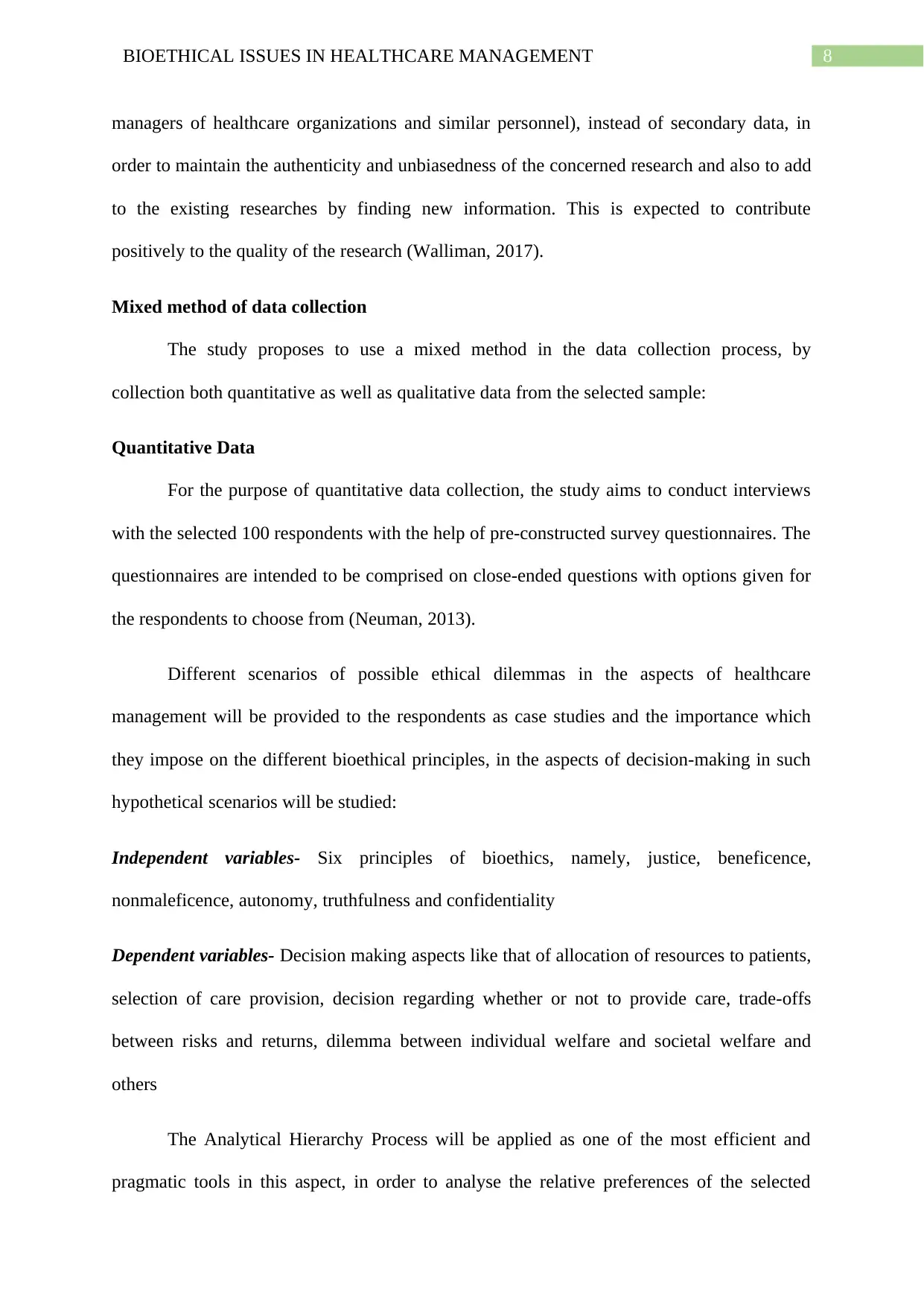
8BIOETHICAL ISSUES IN HEALTHCARE MANAGEMENT
managers of healthcare organizations and similar personnel), instead of secondary data, in
order to maintain the authenticity and unbiasedness of the concerned research and also to add
to the existing researches by finding new information. This is expected to contribute
positively to the quality of the research (Walliman, 2017).
Mixed method of data collection
The study proposes to use a mixed method in the data collection process, by
collection both quantitative as well as qualitative data from the selected sample:
Quantitative Data
For the purpose of quantitative data collection, the study aims to conduct interviews
with the selected 100 respondents with the help of pre-constructed survey questionnaires. The
questionnaires are intended to be comprised on close-ended questions with options given for
the respondents to choose from (Neuman, 2013).
Different scenarios of possible ethical dilemmas in the aspects of healthcare
management will be provided to the respondents as case studies and the importance which
they impose on the different bioethical principles, in the aspects of decision-making in such
hypothetical scenarios will be studied:
Independent variables- Six principles of bioethics, namely, justice, beneficence,
nonmaleficence, autonomy, truthfulness and confidentiality
Dependent variables- Decision making aspects like that of allocation of resources to patients,
selection of care provision, decision regarding whether or not to provide care, trade-offs
between risks and returns, dilemma between individual welfare and societal welfare and
others
The Analytical Hierarchy Process will be applied as one of the most efficient and
pragmatic tools in this aspect, in order to analyse the relative preferences of the selected
managers of healthcare organizations and similar personnel), instead of secondary data, in
order to maintain the authenticity and unbiasedness of the concerned research and also to add
to the existing researches by finding new information. This is expected to contribute
positively to the quality of the research (Walliman, 2017).
Mixed method of data collection
The study proposes to use a mixed method in the data collection process, by
collection both quantitative as well as qualitative data from the selected sample:
Quantitative Data
For the purpose of quantitative data collection, the study aims to conduct interviews
with the selected 100 respondents with the help of pre-constructed survey questionnaires. The
questionnaires are intended to be comprised on close-ended questions with options given for
the respondents to choose from (Neuman, 2013).
Different scenarios of possible ethical dilemmas in the aspects of healthcare
management will be provided to the respondents as case studies and the importance which
they impose on the different bioethical principles, in the aspects of decision-making in such
hypothetical scenarios will be studied:
Independent variables- Six principles of bioethics, namely, justice, beneficence,
nonmaleficence, autonomy, truthfulness and confidentiality
Dependent variables- Decision making aspects like that of allocation of resources to patients,
selection of care provision, decision regarding whether or not to provide care, trade-offs
between risks and returns, dilemma between individual welfare and societal welfare and
others
The Analytical Hierarchy Process will be applied as one of the most efficient and
pragmatic tools in this aspect, in order to analyse the relative preferences of the selected
⊘ This is a preview!⊘
Do you want full access?
Subscribe today to unlock all pages.

Trusted by 1+ million students worldwide
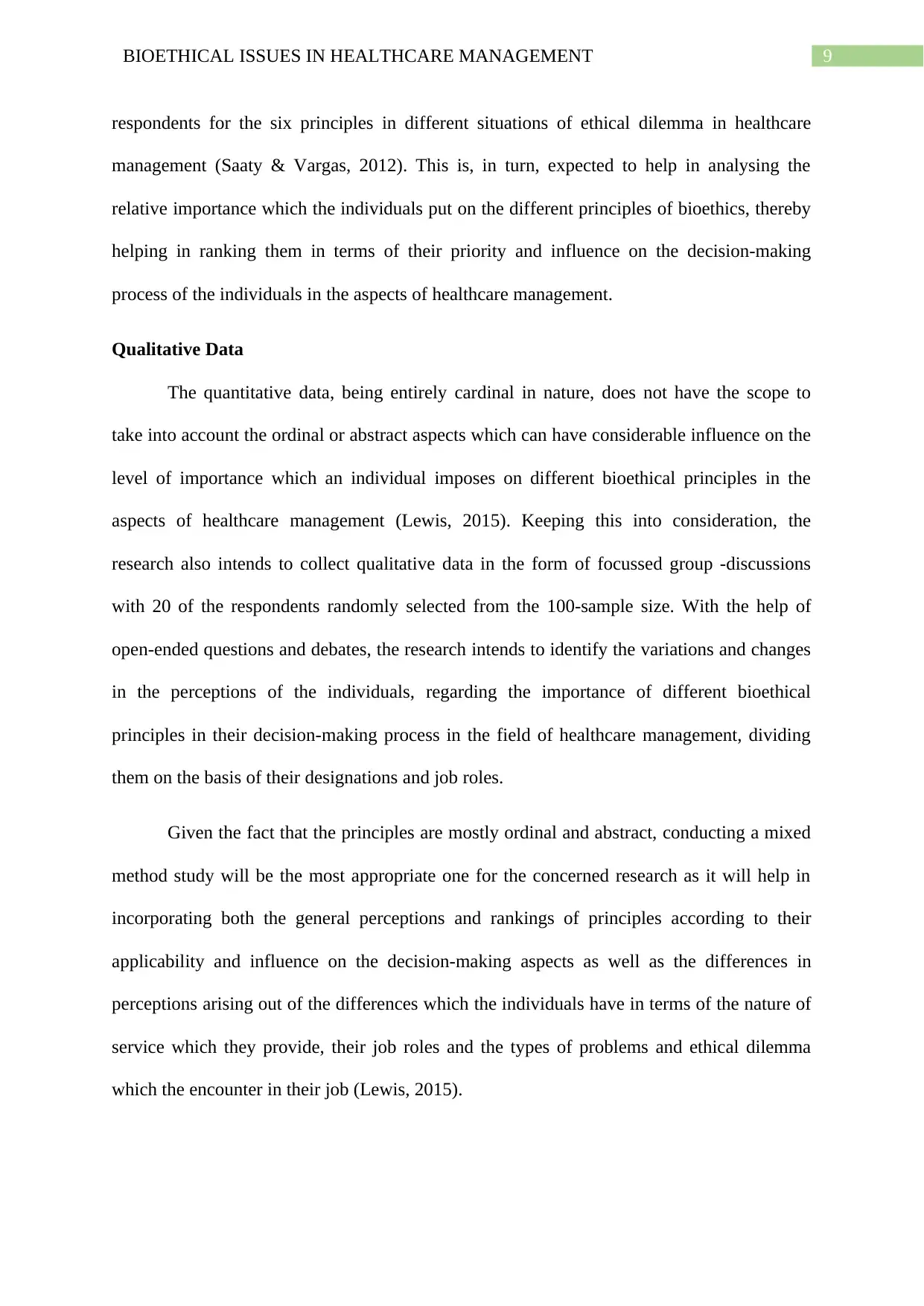
9BIOETHICAL ISSUES IN HEALTHCARE MANAGEMENT
respondents for the six principles in different situations of ethical dilemma in healthcare
management (Saaty & Vargas, 2012). This is, in turn, expected to help in analysing the
relative importance which the individuals put on the different principles of bioethics, thereby
helping in ranking them in terms of their priority and influence on the decision-making
process of the individuals in the aspects of healthcare management.
Qualitative Data
The quantitative data, being entirely cardinal in nature, does not have the scope to
take into account the ordinal or abstract aspects which can have considerable influence on the
level of importance which an individual imposes on different bioethical principles in the
aspects of healthcare management (Lewis, 2015). Keeping this into consideration, the
research also intends to collect qualitative data in the form of focussed group -discussions
with 20 of the respondents randomly selected from the 100-sample size. With the help of
open-ended questions and debates, the research intends to identify the variations and changes
in the perceptions of the individuals, regarding the importance of different bioethical
principles in their decision-making process in the field of healthcare management, dividing
them on the basis of their designations and job roles.
Given the fact that the principles are mostly ordinal and abstract, conducting a mixed
method study will be the most appropriate one for the concerned research as it will help in
incorporating both the general perceptions and rankings of principles according to their
applicability and influence on the decision-making aspects as well as the differences in
perceptions arising out of the differences which the individuals have in terms of the nature of
service which they provide, their job roles and the types of problems and ethical dilemma
which the encounter in their job (Lewis, 2015).
respondents for the six principles in different situations of ethical dilemma in healthcare
management (Saaty & Vargas, 2012). This is, in turn, expected to help in analysing the
relative importance which the individuals put on the different principles of bioethics, thereby
helping in ranking them in terms of their priority and influence on the decision-making
process of the individuals in the aspects of healthcare management.
Qualitative Data
The quantitative data, being entirely cardinal in nature, does not have the scope to
take into account the ordinal or abstract aspects which can have considerable influence on the
level of importance which an individual imposes on different bioethical principles in the
aspects of healthcare management (Lewis, 2015). Keeping this into consideration, the
research also intends to collect qualitative data in the form of focussed group -discussions
with 20 of the respondents randomly selected from the 100-sample size. With the help of
open-ended questions and debates, the research intends to identify the variations and changes
in the perceptions of the individuals, regarding the importance of different bioethical
principles in their decision-making process in the field of healthcare management, dividing
them on the basis of their designations and job roles.
Given the fact that the principles are mostly ordinal and abstract, conducting a mixed
method study will be the most appropriate one for the concerned research as it will help in
incorporating both the general perceptions and rankings of principles according to their
applicability and influence on the decision-making aspects as well as the differences in
perceptions arising out of the differences which the individuals have in terms of the nature of
service which they provide, their job roles and the types of problems and ethical dilemma
which the encounter in their job (Lewis, 2015).
Paraphrase This Document
Need a fresh take? Get an instant paraphrase of this document with our AI Paraphraser
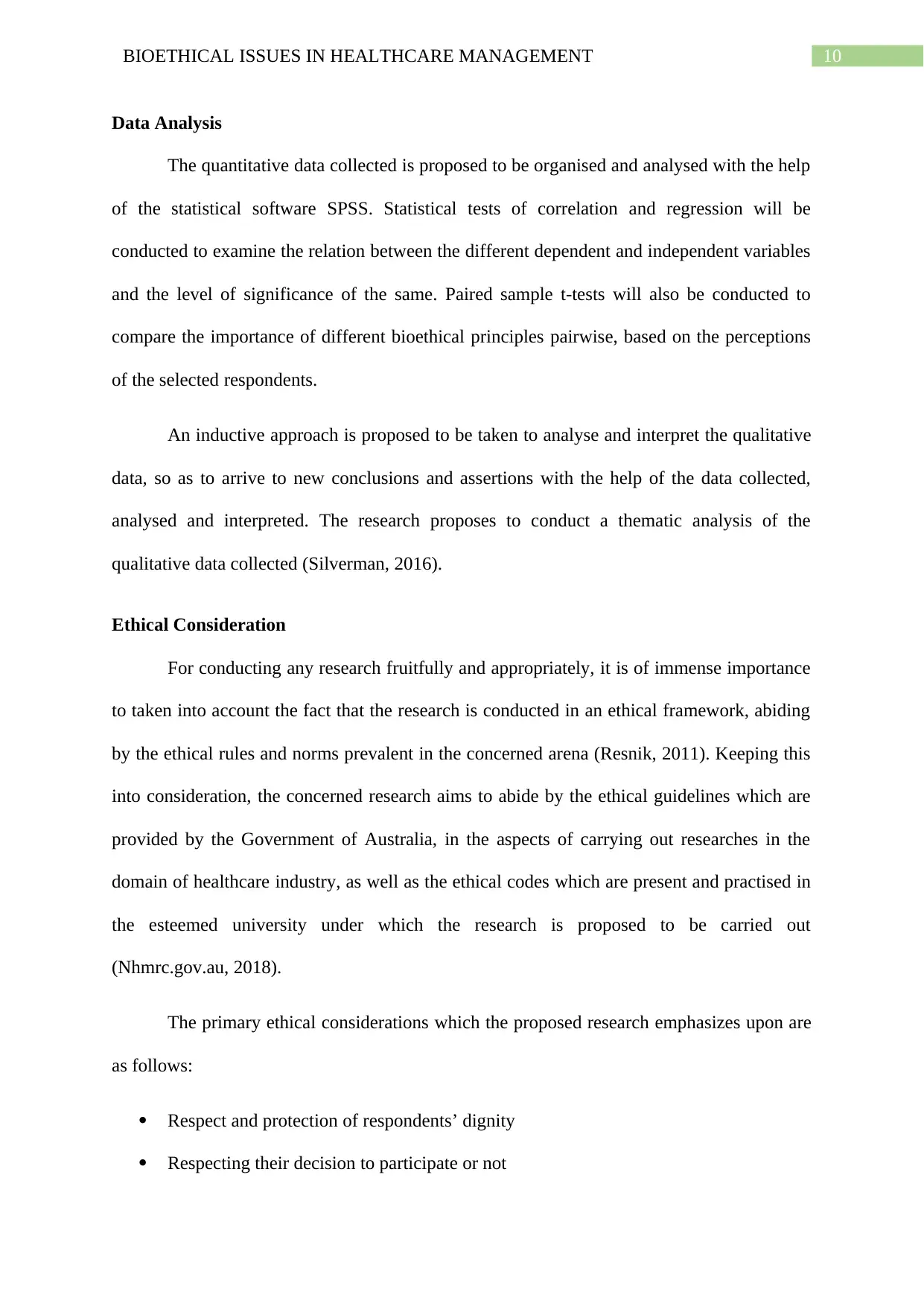
10BIOETHICAL ISSUES IN HEALTHCARE MANAGEMENT
Data Analysis
The quantitative data collected is proposed to be organised and analysed with the help
of the statistical software SPSS. Statistical tests of correlation and regression will be
conducted to examine the relation between the different dependent and independent variables
and the level of significance of the same. Paired sample t-tests will also be conducted to
compare the importance of different bioethical principles pairwise, based on the perceptions
of the selected respondents.
An inductive approach is proposed to be taken to analyse and interpret the qualitative
data, so as to arrive to new conclusions and assertions with the help of the data collected,
analysed and interpreted. The research proposes to conduct a thematic analysis of the
qualitative data collected (Silverman, 2016).
Ethical Consideration
For conducting any research fruitfully and appropriately, it is of immense importance
to taken into account the fact that the research is conducted in an ethical framework, abiding
by the ethical rules and norms prevalent in the concerned arena (Resnik, 2011). Keeping this
into consideration, the concerned research aims to abide by the ethical guidelines which are
provided by the Government of Australia, in the aspects of carrying out researches in the
domain of healthcare industry, as well as the ethical codes which are present and practised in
the esteemed university under which the research is proposed to be carried out
(Nhmrc.gov.au, 2018).
The primary ethical considerations which the proposed research emphasizes upon are
as follows:
Respect and protection of respondents’ dignity
Respecting their decision to participate or not
Data Analysis
The quantitative data collected is proposed to be organised and analysed with the help
of the statistical software SPSS. Statistical tests of correlation and regression will be
conducted to examine the relation between the different dependent and independent variables
and the level of significance of the same. Paired sample t-tests will also be conducted to
compare the importance of different bioethical principles pairwise, based on the perceptions
of the selected respondents.
An inductive approach is proposed to be taken to analyse and interpret the qualitative
data, so as to arrive to new conclusions and assertions with the help of the data collected,
analysed and interpreted. The research proposes to conduct a thematic analysis of the
qualitative data collected (Silverman, 2016).
Ethical Consideration
For conducting any research fruitfully and appropriately, it is of immense importance
to taken into account the fact that the research is conducted in an ethical framework, abiding
by the ethical rules and norms prevalent in the concerned arena (Resnik, 2011). Keeping this
into consideration, the concerned research aims to abide by the ethical guidelines which are
provided by the Government of Australia, in the aspects of carrying out researches in the
domain of healthcare industry, as well as the ethical codes which are present and practised in
the esteemed university under which the research is proposed to be carried out
(Nhmrc.gov.au, 2018).
The primary ethical considerations which the proposed research emphasizes upon are
as follows:
Respect and protection of respondents’ dignity
Respecting their decision to participate or not
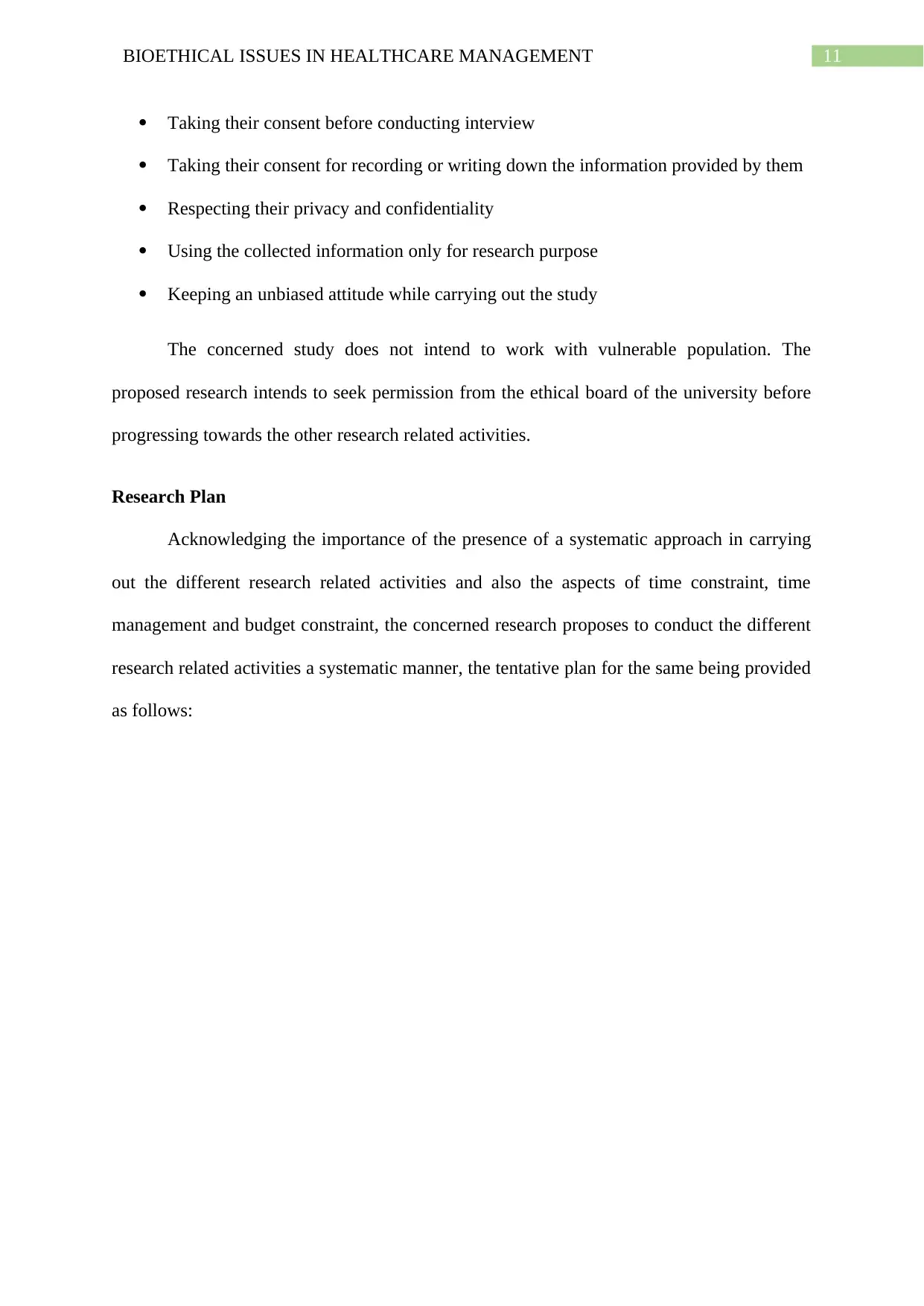
11BIOETHICAL ISSUES IN HEALTHCARE MANAGEMENT
Taking their consent before conducting interview
Taking their consent for recording or writing down the information provided by them
Respecting their privacy and confidentiality
Using the collected information only for research purpose
Keeping an unbiased attitude while carrying out the study
The concerned study does not intend to work with vulnerable population. The
proposed research intends to seek permission from the ethical board of the university before
progressing towards the other research related activities.
Research Plan
Acknowledging the importance of the presence of a systematic approach in carrying
out the different research related activities and also the aspects of time constraint, time
management and budget constraint, the concerned research proposes to conduct the different
research related activities a systematic manner, the tentative plan for the same being provided
as follows:
Taking their consent before conducting interview
Taking their consent for recording or writing down the information provided by them
Respecting their privacy and confidentiality
Using the collected information only for research purpose
Keeping an unbiased attitude while carrying out the study
The concerned study does not intend to work with vulnerable population. The
proposed research intends to seek permission from the ethical board of the university before
progressing towards the other research related activities.
Research Plan
Acknowledging the importance of the presence of a systematic approach in carrying
out the different research related activities and also the aspects of time constraint, time
management and budget constraint, the concerned research proposes to conduct the different
research related activities a systematic manner, the tentative plan for the same being provided
as follows:
⊘ This is a preview!⊘
Do you want full access?
Subscribe today to unlock all pages.

Trusted by 1+ million students worldwide
1 out of 16
Related Documents
Your All-in-One AI-Powered Toolkit for Academic Success.
+13062052269
info@desklib.com
Available 24*7 on WhatsApp / Email
![[object Object]](/_next/static/media/star-bottom.7253800d.svg)
Unlock your academic potential
Copyright © 2020–2026 A2Z Services. All Rights Reserved. Developed and managed by ZUCOL.



